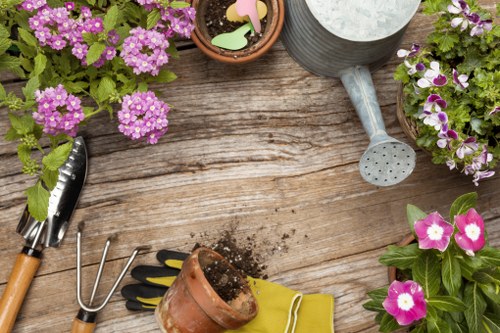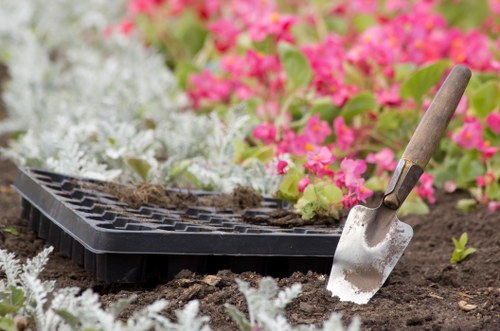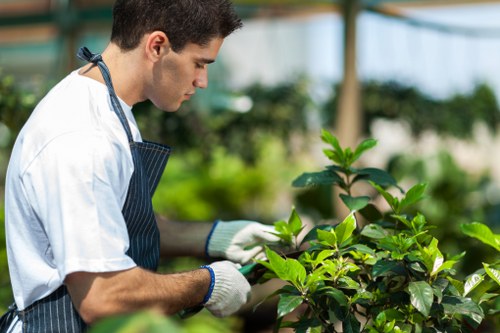Landscaping in Temple: Transforming Your Outdoor Spaces
The Importance of Landscaping in Temple

Landscaping in Temple plays a crucial role in enhancing the aesthetic appeal and functionality of residential and commercial properties. A well-designed landscape not only beautifies your surroundings but also increases property value and provides a serene environment for relaxation.
In the bustling city of Temple, where urban development is rapidly expanding, incorporating natural elements into your property can create a peaceful oasis amidst the concrete jungle. Effective landscaping can lead to a healthier ecosystem by supporting local flora and fauna, improving air quality, and reducing urban heat islands.
Moreover, a thoughtfully designed landscape can offer practical benefits such as erosion control, water management, and energy efficiency. By strategically placing trees and shrubs, homeowners can provide natural shade, reducing the need for artificial cooling and lowering energy bills.
Designing Your Landscape: Key Considerations

When planning landscaping in Temple, it's essential to consider various factors to ensure your outdoor space meets your needs and complements your property's architecture. Start by assessing the existing conditions, including soil quality, sun exposure, and drainage patterns. Understanding these elements will help you select appropriate plants and materials that thrive in Temple's climate.
Another critical aspect is defining the purpose of your landscape. Do you want a space for entertaining, gardening, or simply enjoying nature? Identifying your primary goals will guide the design process and ensure that your landscape serves its intended function effectively.
Additionally, consider the overall style you wish to achieve. Whether you prefer a modern, minimalist garden, a lush, tropical paradise, or a traditional, formal yard, your design choices should reflect your personal taste and complement your home's architecture.
Choosing the Right Plants for Temple's Climate

Selecting plants that are well-suited to Temple's climate is paramount for a successful landscape. Native plants are often the best choice as they are adapted to the local conditions, require less maintenance, and support local wildlife. Incorporating a variety of trees, shrubs, perennials, and groundcovers can add texture, color, and depth to your outdoor space.
Consider the seasonal changes when choosing plants. Selecting species that offer year-round interest, with blooms, foliage, or structural features in different seasons, can ensure your landscape remains vibrant throughout the year. Drought-tolerant plants are particularly beneficial in areas with water restrictions, promoting sustainability and conservation.
Furthermore, pay attention to the size and growth habits of plants to ensure they fit well within the designated space without causing overcrowding or requiring excessive maintenance. Proper planning and selection will result in a harmonious and low-maintenance landscape.
Sustainable Landscaping Practices

Embracing sustainable landscaping practices in Temple not only benefits the environment but also enhances the long-term health and beauty of your outdoor space. Sustainable landscaping focuses on using resources efficiently, minimizing waste, and promoting ecological balance.
Implementing water-wise techniques, such as drip irrigation systems and rainwater harvesting, can significantly reduce water consumption. Incorporating native and drought-resistant plants further contributes to water conservation efforts.
Additionally, using organic fertilizers and pesticides helps protect soil health and prevents harmful chemicals from entering the ecosystem. Composting garden waste and recycling materials for mulching or pathway construction are other effective ways to promote sustainability in your landscape.
Enhancing Curb Appeal with Professional Landscaping Services

Investing in professional landscaping services in Temple can dramatically enhance your property's curb appeal and functionality. Experienced landscapers possess the expertise to design and implement a landscape that aligns with your vision while adhering to best practices and local regulations.
From initial design concepts to the selection of materials and plants, professional landscapers ensure that every aspect of your outdoor space is meticulously planned and executed. They can also provide ongoing maintenance services to keep your landscape looking pristine throughout the seasons.
Moreover, professional landscaping can offer innovative solutions to common outdoor challenges, such as poor drainage, inadequate lighting, or limited space. By leveraging their knowledge and skills, you can achieve a stunning and sustainable landscape that enhances your property's value and your quality of life.
Popular Landscaping Features in Temple

In Temple, a variety of landscaping features are popular among homeowners looking to create inviting and functional outdoor spaces. Some of the most sought-after features include:
- Patiolows: Decorative pathways made from stones, bricks, or pavers that guide visitors through your garden.
- Water Features: Fountains, ponds, and waterfalls that add a soothing element and attract wildlife.
- Outdoor Lighting: Strategically placed lights to enhance safety and highlight landscape features at night.
- Hardscaping Elements: Patios, decks, and retaining walls that provide structure and support to your landscape.
- Garden Structures: Pergolas, arbors, and gazebos that offer shade and create focal points in your garden.
Maintenance Tips for Your Temple Landscape

Maintaining your landscape in Temple requires regular care and attention to ensure it remains healthy and attractive. Here are some essential maintenance tips:
- Regular Pruning: Trim trees and shrubs to encourage healthy growth and prevent overgrowth.
- Weeding: Remove unwanted weeds promptly to reduce competition for nutrients and water.
- Irrigation: Ensure your irrigation system is functioning correctly and adjust watering schedules based on seasonal needs.
- Fertilization: Apply appropriate fertilizers to provide essential nutrients to your plants.
- Pest Control: Monitor for pests and diseases and address issues promptly using eco-friendly methods.
Benefits of Hiring Local Landscape Experts

Hiring local landscape experts in Temple offers several advantages. Local landscapers are familiar with the area's climate, soil conditions, and native plants, allowing them to design landscapes that thrive in the local environment. Their understanding of local building codes and regulations ensures that your project complies with all requirements.
Additionally, local professionals often have established relationships with suppliers and nurseries, providing access to high-quality materials and plants. Their reputation within the community motivates them to deliver exceptional service and customer satisfaction.
Furthermore, supporting local businesses contributes to the local economy and fosters a sense of community. Choosing a local landscaper ensures personalized service and a deeper investment in the success of your landscaping project.
Trends in Landscaping for Temple in 2024

Landscaping trends are continually evolving, reflecting changes in lifestyle, technology, and environmental awareness. For Temple in 2024, some of the prominent landscaping trends include:
- Smart Irrigation Systems: Utilizing technology to optimize watering schedules and conserve water.
- Native Plant Gardens: Emphasizing the use of indigenous plants to create sustainable and low-maintenance landscapes.
- Outdoor Living Spaces: Expanding patios and decks to include kitchens, lounges, and entertainment areas.
- Vertical Gardens: Incorporating vertical plantings on walls and fences to maximize space and add greenery.
- Edible Landscaping: Integrating fruit trees, vegetable gardens, and herb beds into traditional landscape designs.
Cost Considerations for Landscaping Projects

Budgeting is a critical aspect of any landscaping project in Temple. Understanding the costs involved helps in planning and ensures that you achieve desired outcomes without overspending. Key cost factors include:
- Design Fees: Professional design services can vary based on the complexity and scale of the project.
- Materials: Costs for plants, hardscaping materials, and other supplies depend on quality and availability.
- Labor: Hiring skilled landscapers and laborers affects the overall budget.
- Maintenance: Ongoing maintenance costs should be considered for long-term landscape health.
- Permits: Obtaining necessary permits for large-scale projects may incur additional expenses.
Tips to Manage Landscaping Costs
- Prioritize essential elements and phase the project to spread costs over time.
- Choose cost-effective materials that offer durability and aesthetic appeal.
- Opt for native and low-maintenance plants to reduce long-term upkeep expenses.
- Obtain multiple quotes from reputable landscaping companies to find the best value.
- Plan for seasonal planting to take advantage of natural growth cycles and reduce costs.
By carefully planning and managing your landscaping budget, you can achieve a beautiful and functional outdoor space that aligns with your financial resources.
Choosing the Right Landscaping Company in Temple

Selecting a reputable landscaping company in Temple is essential for the success of your project. Here are some factors to consider when making your choice:
- Experience: Look for companies with a proven track record and extensive experience in landscaping projects similar to yours.
- Portfolio: Review their portfolio to assess the quality and diversity of their work.
- Licensing and Insurance: Ensure the company is properly licensed and insured to protect against potential liabilities.
- References: Request references or read reviews from past clients to gauge customer satisfaction.
- Transparency: Choose a company that provides clear and detailed estimates, outlines project timelines, and communicates effectively.
Taking the time to research and select the right landscaping company will lead to a smoother project experience and a landscape that exceeds your expectations.
Integrating Technology into Landscaping

Advancements in technology have significantly impacted the landscaping industry, offering innovative solutions to enhance design, maintenance, and sustainability. Integrating technology into your landscaping projects in Temple can provide numerous benefits:
- Smart Irrigation: Automated irrigation systems equipped with sensors and timers optimize water usage based on real-time weather data.
- Landscape Design Software: Digital tools allow for precise planning and visualization of your landscape before implementation.
- LED Lighting: Energy-efficient LED lights enhance nighttime visibility and highlight landscape features.
- Drones: Drones can be used for aerial surveys, monitoring plant health, and capturing high-quality images of large landscapes.
- Sustainable Materials: Innovative materials, such as recycled plastics and permeable pavers, contribute to environmentally friendly landscaping practices.
By embracing these technologies, homeowners and businesses in Temple can achieve more efficient, appealing, and sustainable landscapes.
Seasonal Landscaping Tips

Maintaining a vibrant landscape year-round requires adapting to the changing seasons. Here are some seasonal landscaping tips for Temple:
- Spring: Begin with cleaning up debris, planting new flowers, and fertilizing the soil to encourage healthy growth.
- Summer: Focus on watering, pruning, and pest control to keep plants thriving during the hot months.
- Fall: Prepare for winter by mulching, planting cover crops, and trimming back perennials.
- Winter: Protect plants from frost, clear snow from paths, and plan for next year's landscape enhancements.
Preparing for Spring Planting
- Test and amend soil to ensure optimal conditions for new plants.
- Select a mix of annuals and perennials to provide continuous color and structure.
- Install new irrigation systems or repair existing ones to handle increased watering needs.
By following these seasonal guidelines, you can maintain a healthy and beautiful landscape throughout the year.
How Landscaping Enhances Property Value

Investing in landscaping in Temple can significantly enhance your property's value and appeal to potential buyers. A well-maintained landscape creates a positive first impression, making your home more attractive and inviting.
Key ways landscaping adds value include:
- Increased Curb Appeal: Professional landscaping improves the visual appeal of your property, leading to higher perceived value.
- Extended Living Space: Outdoor areas such as patios and decks provide additional functional living space, which is highly desirable.
- Energy Efficiency: Strategic planting of trees and shrubs can reduce energy costs by providing natural shade and windbreaks.
- Environmental Benefits: Sustainable landscaping practices contribute to a healthier environment, which is increasingly important to buyers.
- Low-Maintenance Features: Incorporating durable and easy-to-maintain elements ensures long-term appeal and reduces upkeep costs.
Overall, a thoughtfully designed and maintained landscape is a valuable investment that pays off through increased property value and enhanced quality of life.
DIY Landscaping vs. Professional Services

When it comes to landscaping in Temple, homeowners often face the choice between DIY projects and hiring professional services. Both approaches have their pros and cons:
- DIY Landscaping: Ideal for those with a limited budget and a hands-on approach, DIY projects allow for personal creativity and flexibility. However, they require time, effort, and a certain level of expertise to achieve professional results.
- Professional Landscaping: Offers expertise, experience, and access to high-quality resources. Professionals can execute complex designs efficiently and ensure long-lasting results. The downside is the higher upfront cost compared to DIY efforts.
Ultimately, the decision depends on your budget, skills, and the scope of your landscaping project. For larger, more intricate designs, professional services might be the better option to ensure success and durability.
Lighting Solutions for Your Temple Landscape

Proper lighting is an essential component of any landscape design, enhancing both aesthetics and safety. In Temple, innovative lighting solutions can transform your outdoor space after dark, creating ambiance and highlighting key features.
- Pathway Lighting: Illuminating walkways and driveways improves safety and guides guests through your garden.
- Accent Lighting: Focused lights on plants, trees, or architectural elements add visual interest and depth.
- Ambient Lighting: Soft, overall lighting creates a warm and inviting atmosphere for outdoor gatherings.
- Security Lighting: Strategically placed lights deter intruders and enhance the security of your property.
- Solar Lighting: An eco-friendly option that reduces energy consumption by utilizing solar power.
Energy-Efficient Lighting Options
- LED Lights: Long-lasting and energy-efficient, LEDs are a popular choice for sustainable landscaping.
- Solar-Powered Fixtures: Harnessing solar energy reduces electricity costs and environmental impact.
- Motion Sensors: Automated lights that activate upon detecting movement enhance security without wasting energy.
Incorporating these lighting solutions can elevate your landscape's functionality and beauty, providing enjoyment and safety well into the evening hours.
Water Management in Landscaping

Effective water management is a vital aspect of sustainable landscaping in Temple. Proper techniques ensure that your landscape remains healthy while conserving water and preventing issues like erosion and flooding.
- Rain Gardens: Depressed areas that capture and absorb rainwater, reducing runoff and promoting groundwater recharge.
- Swales: Shallow, vegetated channels that direct water flow and prevent soil erosion.
- Permeable Pavers: Allow water to infiltrate through surfaces, minimizing runoff and replenishing the soil.
- Mulching: Retains soil moisture, suppresses weeds, and regulates soil temperature.
- Irrigation Zones: Dividing your landscape into zones enables targeted watering based on specific plant needs.
Implementing Efficient Irrigation Systems
- Drip Irrigation: Delivers water directly to plant roots, reducing evaporation and water waste.
- Smart Controllers: Adjust watering schedules based on weather conditions and soil moisture levels.
- Rain Sensors: Prevent the irrigation system from running during rainfall, conserving water.
By incorporating these water management strategies, you can create a resilient and eco-friendly landscape that thrives with minimal water usage.
Choosing Hardscaping Materials

Hardscaping elements such as patios, walkways, and retaining walls provide structure and functionality to your landscape. Selecting the right materials is essential for durability, aesthetics, and maintenance.
- Natural Stone: Offers a timeless and elegant appearance, suitable for various design styles. Types include granite, limestone, and slate.
- Concrete: Versatile and cost-effective, concrete can be molded into different shapes and textures.
- Brick: Adds traditional charm and is available in a range of colors and patterns.
- Wood: Ideal for decks and pergolas, providing a warm and natural look.
- Gravel: Low-maintenance and permeable, suitable for pathways and driveways.
Factors to Consider When Choosing Materials
- Climate Resistance: Ensure materials can withstand Temple's weather conditions.
- Maintenance Requirements: Select materials that align with your maintenance preferences.
- Budget: Balance quality and cost to achieve the desired look within your budget.
- Environmental Impact: Opt for sustainable and eco-friendly materials to minimize ecological footprint.
Careful selection of hardscaping materials contributes to a cohesive and functional landscape that stands the test of time.
Creating Private Outdoor Spaces

Privacy is a key concern for many homeowners when designing their landscapes. Creating secluded outdoor spaces allows you to enjoy your garden without disturbances from neighbors or passersby.
- Fencing: Installing fences made of wood, metal, or composite materials provides a physical barrier and defines boundaries.
- Hedges and Shrubs: Dense plantings can serve as natural screens, adding greenery while enhancing privacy.
- Privacy Screens: Decorative panels or lattices can obstruct views while allowing for light and airflow.
- Strategic Plant Placement: Positioning taller plants and trees around seating areas creates intimate spaces.
- Pergolas and Gazebos: These structures offer sheltered areas that can be further enhanced with climbing plants or curtains for added seclusion.
By incorporating these elements, you can design private outdoor retreats that offer comfort and tranquility within your landscape.
Innovative Garden Design Ideas

Exploring innovative design ideas can elevate your landscape, making it unique and reflective of your personal style. Here are some creative concepts to consider:
- Vertical Gardens: Utilize wall space for plantings, perfect for small gardens or adding greenery to hard surfaces.
- Zen Gardens: Incorporate minimalist elements, rocks, and sand to create a peaceful, meditative space.
- Herb and Vegetable Gardens: Integrate edible plants into your landscape for a functional and attractive feature.
- Water Features: Design custom ponds, streams, or waterfalls to add movement and sound to your garden.
- Artistic Elements: Incorporate sculptures, mosaics, or themed decorations to infuse personality into your landscape.
Maximizing Small Spaces
- Choose compact plant varieties and multi-functional furniture.
- Use mirrors or reflective surfaces to create the illusion of more space.
- Implement tiered planting beds or raised gardens to optimize space utilization.
- Incorporate movable elements to adapt the space as needed.
These innovative ideas can help you create a personalized and standout landscape that complements your lifestyle and preferences.
Integrating Fire Features into Your Landscape

Fire features such as fire pits, fireplaces, and outdoor fireplaces add warmth and ambiance to your landscape. They create focal points and provide a gathering spot for family and friends during cooler evenings.
- Fire Pits: Portable or built-in fire pits are versatile and can be placed in various locations within your garden.
- Outdoor Fireplaces: Permanent structures that offer a sophisticated and functional element to your outdoor living space.
- Fire Tables: Combining a table with a built-in fire feature creates a unique and practical addition to dining areas.
- Gas vs. Wood: Choose between clean-burning gas options or traditional wood-burning features based on your preferences and convenience.
- Safety Considerations: Ensure proper placement and installation to prevent accidents and comply with local regulations.
Enhancing Evening Gatherings
- Add comfortable seating around the fire feature.
- Incorporate lighting to highlight the area and extend usability into the night.
- Use weather-resistant materials to ensure longevity and durability.
Fire features not only enhance the visual appeal of your landscape but also provide functional benefits, making your outdoor space enjoyable year-round.
Choosing the Right Lawn for Your Property

The right lawn can significantly impact the overall look and feel of your landscape. Selecting a suitable grass type for Temple's climate ensures a healthy and resilient lawn.
- Bermuda Grass: Known for its durability and drought resistance, ideal for high-traffic areas.
- Zoysia Grass: Offers a dense and lush appearance with good shade tolerance.
- St. Augustine Grass: Thrives in warm climates and provides a thick, green lawn.
- Fescue Grass: Suitable for cooler seasons, offering a fine texture and rich color.
- Kentucky Bluegrass: Favored for its vibrant green color and ability to recover from damage.
Lawn Maintenance Tips
- Mow regularly to maintain optimal grass height and encourage healthy growth.
- Water deeply but infrequently to promote deep root development.
- Fertilize appropriately based on grass type and seasonal needs.
- Aerate the soil to improve water and nutrient absorption.
- Control weeds and pests through integrated pest management practices.
A well-chosen and properly maintained lawn enhances the beauty and functionality of your landscape, providing a versatile space for recreation and relaxation.
Creating Shade with Trees

Trees are a vital component of any landscape, offering shade, beauty, and environmental benefits. Selecting the right tree species for Temple's climate ensures longevity and resilience.
- Oak Trees: Majestic and long-lived, providing ample shade and supporting local wildlife.
- Maple Trees: Known for their vibrant fall foliage and strong branches.
- Cedar Trees: Evergreen varieties that offer year-round privacy and texture.
- Fruit Trees: Combining beauty with functionality, offering seasonal fruits and blossoms.
- Flowering Trees: Enhancing visual appeal with colorful blooms during specific seasons.
Benefits of Shade Trees
- Reduce cooling costs by providing natural shade to your home.
- Improve air quality by absorbing pollutants and producing oxygen.
- Enhance property aesthetics and provide habitat for wildlife.
- Protect soil from erosion and improve soil health.
- Offer cooling effects and create comfortable outdoor living spaces.
Incorporating shade trees into your landscape design not only adds beauty and value but also contributes to a sustainable and comfortable outdoor environment.
Enhancing Privacy with Fencing and Screens

Enhancing privacy in your landscape can be achieved through various fencing and screening solutions. These elements create secluded areas and block unwanted views, providing a sense of security and comfort.
- Wood Fences: Classic and versatile, available in various heights and styles to match your design preferences.
- Metal Fences: Durable and low-maintenance, offering modern aesthetics with options like wrought iron or aluminum.
- Lattice Panels: Decorative screens that add elegance while partially blocking views.
- Hedge Walls: Dense plantings that act as natural barriers and enhance privacy.
- Bamboo Fencing: Eco-friendly and visually appealing, ideal for tropical or Asian-inspired landscapes.
Choosing the Right Privacy Solution
- Determine the level of privacy needed based on the location and purpose of the space.
- Select materials that complement your existing landscape and architectural style.
- Consider maintenance requirements and durability when choosing fencing options.
- Incorporate decorative elements like post caps, finials, or patterns to add character.
- Ensure compliance with local regulations and zoning laws related to fencing and height restrictions.
By selecting the appropriate fencing and screening solutions, you can effectively create private and inviting outdoor spaces that meet your needs and enhance your landscape's overall appeal.
Incorporating Sustainable Practices

Sustainability is a key consideration in modern landscaping, focusing on minimizing environmental impact and promoting ecological balance. Incorporating sustainable practices in your landscape design in Temple ensures long-term health and resilience.
- Native Plants: Reduce water usage and support local biodiversity by choosing plants adapted to the local climate.
- Permeable Surfaces: Allow rainwater to infiltrate the ground, reducing runoff and replenishing groundwater.
- Composting: Recycle organic waste to enrich the soil and reduce landfill contributions.
- Energy-Efficient Lighting: Utilize LED or solar-powered lights to decrease energy consumption.
- Recycled Materials: Incorporate materials like reclaimed wood or recycled plastics to minimize waste and promote reuse.
Benefits of Sustainable Landscaping
- Conserves natural resources and reduces utility costs.
- Enhances biodiversity and supports wildlife habitats.
- Improves soil health and water quality.
- Creates a healthier and more resilient landscape.
- Contributes to the overall environmental sustainability of the community.
Adopting sustainable landscaping practices not only benefits the environment but also creates a landscape that is economical, beautiful, and enduring.
Conclusion
Landscaping in Temple offers a myriad of opportunities to enhance the beauty, functionality, and sustainability of your outdoor spaces. By carefully planning and incorporating the right elements, you can create a landscape that reflects your personal style, supports the local ecosystem, and adds significant value to your property.
Whether you choose to undertake a DIY project or hire professional landscaping services, prioritizing quality, sustainability, and thoughtful design will ensure a successful and rewarding outcome.
Contact us today to transform your landscape into a stunning and sustainable outdoor haven.
